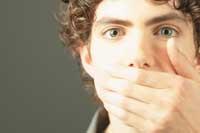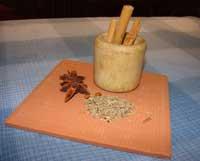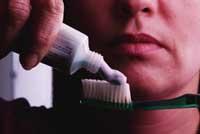Snails of the txikis of the mouth
2008/02/24 Lakar Iraizoz, Oihane - Elhuyar Zientzia

About six hundred species of bacteria take advantage of the unique environment we offer them, feeding on leftovers of food left in the mouth, dead cells and mucus. As a counterpart, some expel gaseous compounds of annoying smell.
Inspiration occurs mainly in the back of the tongue. It seems that the muci that pour under the nose, on the way down the throat, stick in the tongue and spend hours and days. The bacteria present produce the breath in its decomposition.
Destroy bacteria from the mouth
All cultures of the world are responsible for breathing, and each culture has found one way or another to combat it: Brazilians chew the cinnamon sticks, the clavi Iraqis, the ones of Singapore the skin of the guava fruit, the seeds of anise in East Asia, etc.

We all know how unpleasant it is, both for oneself and for others, to have bad smell in the mouth. Some, however, go beyond mere responsibility and are obsessed with dealing with their supposed encouragement. And often the breath is just an illusion. The first advice that experts give us in this matter is to verify that what seems to you encouragement is an authentic encouragement. In this sense, they carried out an experiment in which they compared the smell that each one perceives with the measured by an instrument of measurement of the breath and showed that the smell that it perceives is twice what it has in itself!
The Parafarmacia product industries also benefit from this responsibility. They invent and sell countless products such as pickups, elixirs, mint, sprays or special dental pastes. Some are effective, but most only disguise the breath for a short time.

They also spread beliefs that are not true to sell their products. For example, it is very widespread that the greater the feeling of irritation occurs in the products or the more foams are produced, the more efficient they are. And it doesn't have to be that way. The burning sensation in the mouth indicates that people who are suffering damage are cells of their own mouth and not bacteria that are necessarily present in the mouth.
Our body spontaneously removes bacteria: through saliva we ingest many of them and when they reach the stomach they are eliminated. When salivation is lower, for example while we sleep, we produce less saliva, so we eat much less bacteria. While we do not eat, the bacteria continue to grow, feeding and, of course, producing gaseous compounds of unpleasant smell. Therefore, in the morning, just awakened, it is normal to have breath.
In most cases it is sufficient with adequate oral hygiene to keep bacterial growth under control. Keep under control, but it would not be easy to destroy all bacteria in the mouth. And even if it were possible, it would not be convenient, since the bacteria disappeared, other living things like mushrooms would enter our mouth. This means that we would receive a fungal infection. The remedy would be worse than evil!
Published in 7K.

Gai honi buruzko eduki gehiago
Elhuyarrek garatutako teknologia





